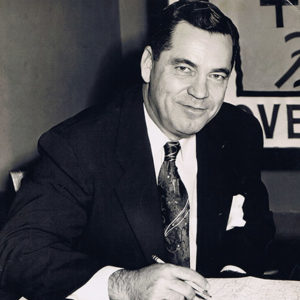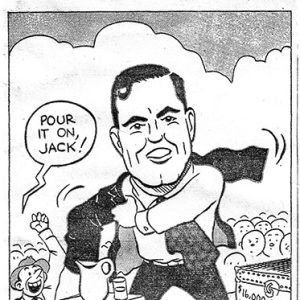calsfoundation@cals.org
Jack Wilson Holt Sr. (1903–1998)
Jack Wilson Holt Sr. was an eminent Arkansas politician for two decades in the mid-twentieth century. He was attorney general for three terms before World War II but lost three bitter races for governor and U.S. senator to the dominant politicians of the postwar era—John L. McClellan, Sid McMath, and Francis Cherry.
Jack Holt, one of eleven children of Bud and Adeline Holt, was born on February 7, 1903, on his family’s farm along Crooked Creek north of Harrison (Boone County). He entered the first grade at a one-room school at Walnut Grove and graduated from Harrison High School, where he was a basketball and track star. He often rode a pony into town to attend high school. Holt received a Bachelor of Law degree in 1927 at the University of Arkansas (UA) in Fayetteville (Washington County), where he developed political skills and ambitions. There, he met and married Margaret Spikes of Walnut Ridge (Lawrence County); they had two children, Jack Jr. and Margaret Ann (known as Peggy).
Back in Harrison, Holt began practicing law with E. G. Mitchell, a former circuit judge. In 1928, at the age of twenty-five, he was elected prosecuting attorney for the Fourteenth Circuit. He served three terms and was elected circuit judge in 1934. He resigned two years later to run for attorney general in the Democratic Party primary, succeeding Carl E. Bailey, who had been elected governor.
Holt, his brother Frank, and his son Jack Holt Jr. all served as attorney general in Arkansas. The Holt brothers were both elected, and the younger Holt was appointed in 1962 to finish the term of his uncle Frank, who had been elected to the Arkansas Supreme Court. (Jack Holt Jr. subsequently was elected chief justice of the Arkansas Supreme Court.)
In 1942, Holt entered the race for U.S. senator, a position vacated when President Franklin D. Roosevelt appointed Senator John E. Miller to a federal judgeship for the Western District of Arkansas. Holt’s opponents were three U.S. representatives—David D. Terry of Little Rock (Pulaski County), John L. McClellan of Camden (Ouachita County), and Clyde T. Ellis of Bentonville (Benton County). Governor Homer Adkins, who controlled a powerful political machine, encouraged him to make the race, and Holt believed he had Adkins’s critical support. But Adkins also had encouraged Terry and did not put his formidable organization into Holt’s service. Holt received a plurality of votes against the three congressmen, which in the past would have been sufficient for victory, but Amendment 29, adopted in 1938, required a runoff if no candidate received a majority. In the runoff with McClellan, he faced the united opposition of the three congressmen and the powerful political organization of Harvey Couch and Arkansas Power and Light (AP&L). McClellan won and would serve for thirty-five years.
After his defeat, though beyond draft age, Holt enlisted in the U.S. Army and attained the rank of captain, serving mainly on army bases in Louisiana. After the end of World War II, he started a trial law practice with his brother Frank.
In 1948, Holt ran for governor along with nine other Democrats. His major opponents were McMath, a prosecuting attorney who broke up the political machine of Mayor Leo McLaughlin in Hot Springs (Garland County), and James “Uncle Mac” MacKrell, a roving preacher and radio evangelist. McMath led the ticket with Holt in second place.
The runoff was one of the most turbulent races in the state’s history. The Dixiecrat rebellion against the race policies of President Harry S. Truman and the national Democratic Party pushed integration to the forefront of the race. Holt sided with the Dixiecrat faction, while McMath skirted the issue, refusing to be drawn into race-baiting. African Americans, who had begun participating in Democratic primaries for the first time, voted for McMath.
MacKrell joined Holt on the stump for the stormy two-week runoff campaign. Like McMath, Holt was a formidable orator, and he and MacKrell attracted large crowds. McMath won by 10,000 votes, but he later commented that, if the campaign had lasted two more weeks, Holt would have won. Holt and McMath collided one more time, in 1952, when McMath ran for a third term. A Jonesboro (Craighead County) chancery judge, Francis Cherry, beat them both.
Many years later, as part of the Alcoholics Anonymous twelve-step program that encouraged alcoholics like Holt to make peace with old enemies, Holt went to see McMath, then in private law practice. They became close friends. McMath, at age eighty-six, blind and infirm, delivered the eulogy at Holt’s funeral in 1998.
Holt practiced law in Little Rock and was elected municipal judge in Little Rock in 1970. He began a probation program for first offenders, sending drug abusers to a treatment program rather than to circuit court for trial. The program was adopted by other courts across the state.
Holt died on December 16, 1998. He is buried at Holt Cemetery near his boyhood home on Gaither Mountain in Boone County.
For additional information:
Caillouet, Linda S. “Jack Holt Sr., Former State Attorney General, Judge, Dies.” Arkansas Democrat-Gazette, December 17, 1998, p. 2B.
Lester, Jim. A Man for Arkansas: Sid McMath and the Southern Reform Tradition. Little Rock: Rose Publishing Co., 1976.
McMath, Sidney S. Promises Kept. Fayetteville: University of Arkansas Press, 2003.
Woods, James. The Era of Sid McMath, Arkansas Political Leader, 1946–1954. Little Rock: 1975.
Ernest Dumas
Little Rock, Arkansas
 World War II through the Faubus Era, 1941 through 1967
World War II through the Faubus Era, 1941 through 1967 Jack Wilson Holt Sr.
Jack Wilson Holt Sr.  Jack Wilson Holt Sr. Cartoon
Jack Wilson Holt Sr. Cartoon 




Comments
No comments on this entry yet.